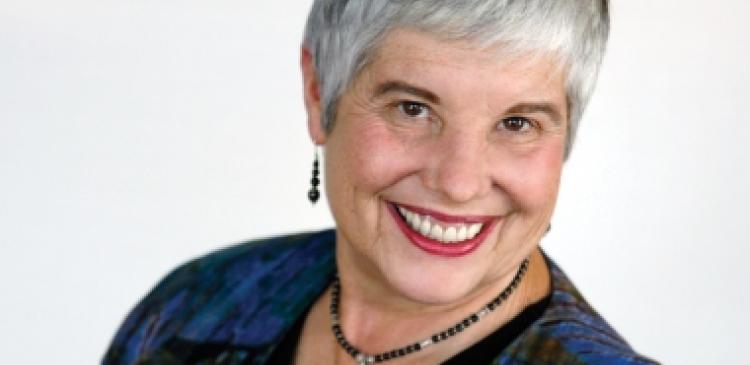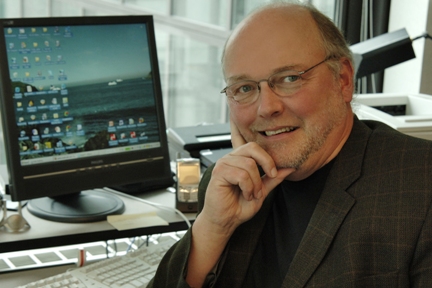Eglal Rached
Their expertise in agriculture and the environment, economic policy, and information and communication technologies have contributed significantly to the Centre’s programs in these areas.
Eglal Rached — Pasture, water, and policy influence
Eglal Rached, the director of IDRC’s regional office for the Middle East and North Africa, retired after 24 years at the Centre. From her early days as a program officer, Rached rose to team leader, and then chief scientist for natural resource management. She was appointed regional director for the Middle East and North Africa in 1997.
Rached’s expertise in agriculture, biodiversity, and natural resource management brought her to IDRC. Her work in the early 1990s took her to remote villages in the vast Maghreb steppes to support Tunisian, Moroccan, and Algerian scientists. Having ventured out of their research centres for the first time, these researchers identified the varied ways in which people traditionally managed lands held in common.
“There would be a rock or a tree in the middle of 30 000 hectares and that would indicate the boundary,” Rached says.
As a result of this research, many traditional land management practices were reintroduced to replace centralized systems and promote environmental rehabilitation.
A leader in water issues
Water issues have been a passion of Rached’s, who has overseen 15 years of IDRC support for research on water demand management. Water scarcity was seen as something you could do nothing about, Rached explains, and IDRC was one of the first donors in the region to identify it as a priority.
The Centre supported studies on methods to reduce the demand for water, a regional forum for researchers to exchange information on the issue, and activities to communicate findings to policymakers. (Read more about Wadimena)
“The project has just ended with resounding success if you consider that demand management is now part of almost every politician’s discourse on water in the region. Of course the challenge is now implementation.”
Rached has engaged with many junior researchers over the last 24 years who have grown into leadership positions. Shadi Hamadeh, coordinator of the Environment and Sustainable Development Unit in Beirut is one example, as is Mahmoud Abou Zeid who was Egypt’s Minister of Water Resources and Irrigation from 2000 to 2008. Their advancement, Eglal Rached says, has been the most rewarding aspect of her work.
Constance Freeman — Classroom and street-level economics
For 10 years, Connie Freeman has directed IDRC’s Regional Office for Eastern and Southern Africa, in Nairobi, Kenya. She took on the job after working for 30 years on African issues, in several African countries and the United States.
An economist by training, Freeman salutes IDRC’s 20-year relationship with the African Economic Research Consortium (AERC), based in Kenya. “This consortium provides the best economic training in Africa, says Freeman. Its master’s and PhD programs “piggy-back on African university programs by enriching them for three to four months every summer.”
AERC’s research initiatives tackle key economic issues such as Indian and Chinese investment in Africa. “They are providing information to 21 African governments on how to drive better deals with the Chinese,” says Freeman.
Rare opportunities in Angola
In Angola, the informal economy [operating without government regulation and bank financing] captured Freeman’s attention. By 2005, Angola had reached some measure of stability after close to three decades of civil war. Freemen went to assess the environment for IDRC programming.
“Angola had perhaps one of the last pristine informal economies on the continent,” she says.
IDRC funded the Angolan non-governmental organization, Development Workshop, to study informal markets from housing, to door-to-door sales, to water supply.
“It’s probably one of the best studies of the operations of the informal economy in existence,” Freeman says.
The Angolan government used the findings to develop better housing policy and can draw on them again in future efforts to regulate informal activities.
Constance Freeman is proud of the African character of IDRC’s work in the region. The regional office has often taken the advice of African partners, she says, and recognizes that the ownership of the research rests with the people who are carrying it out.
Richard Fuchs — Technology and effective communications
An award-winning technology consultant from Newfoundland, Canada, Richard Fuchs joined IDRC in early 2001, just in time to help position the Centre as an important player in increasing access to digital technologies in developing countries.
As director of the Information and Communication Technologies for Development program, Fuchs promoted the use of digital technologies to address development challenges. He did so internationally — in forums such as the 2001 Digital Opportunities Task Force created at the G8 summit in Okinawa, Japan, and the World Summit on the Information Society.
Equally significant to Fuchs were small but groundbreaking events such as the 2004 training session in Kampala where the first 40 Ugandan health workers learned to work with hand-held computers. Six years later, Fuchs says, the devices are integral to Uganda’s health system. Healthcare providers use them to send inventory and disease surveillance data and to access information. The research, led by AED-Satellife, has shown that the technology improved productivity, efficiency, and cost-effectiveness in Uganda.
Mapping research results
Fuchs also recalls the impact achieved by the “Internet Out of Africa” map. IDRC and four African research centres, working together to help the continent transition into the Information Society, produced the map. Distributed by the thousands, it clearly showed the lack of marine fibre optic cable in 2002 to link East Africa to the rest of the world. Three cables now serve the sub-region and more are planned. Internet speed and availability have grown as a result.
Fuchs brought the experience with him to Singapore when he became regional director for Southeast and East Asia in 2006. Three years later, the South East Asia Climate Change Vulnerability map catapulted the issue of climate change to the front page of every English-language daily in Manila, Bangkok, Phnom Penh, and Jakarta. It made climate change science understandable to ordinary people.
Richard Fuchs has enjoyed making connections among ideas, institutions, and people associated with IDRC: “It’s been a great run.”
Eglal Rached, Connie Freeman, and Richard Fuchs have contributed to the respect that IDRC enjoys in the regions where they have worked. This respect is key to the Centre’s ability to promote growth and development through research.





